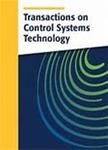版权所有:内蒙古大学图书馆 技术提供:维普资讯• 智图
内蒙古自治区呼和浩特市赛罕区大学西街235号 邮编: 010021

作者机构:Swiss Fed Inst Technol Automat Control Lab CH-8092 Zurich Switzerland
出 版 物:《IEEE TRANSACTIONS ON CONTROL SYSTEMS TECHNOLOGY》 (IEEE控制系统技术汇刊)
年 卷 期:2021年第29卷第1期
页 面:96-107页
核心收录:
学科分类:0808[工学-电气工程] 08[工学] 0811[工学-控制科学与工程]
基 金:SCCER FEEBD Project European Research Council [ERC-2017-ADG-787845]
主 题:Approximation algorithms Dynamic programming Computational modeling Optimal control Energy storage Heuristic algorithms Optimization Dual dynamic programming (DDP) hydro optimization nonlinear model predictive control (NMPC) optimal control
摘 要:We present an approximate method for solving nonlinear control problems over long time horizons, in which the full nonlinear model is preserved over an initial part of the horizon, while the remainder of the horizon is modeled using a linear relaxation. As this approximate problem may still be too large to solve directly, we present a Benders decomposition-based solution algorithm that iterates between solving the nonlinear and linear parts of the horizon. This extends the dual dynamic programming approach commonly employed for optimization of linearized hydro power systems. We prove that the proposed algorithm converges after a finite number of iterations, even when the nonlinear initial stage problems are solved inexactly. We also bound the suboptimality of the split-horizon method with respect to the original nonlinear problem, in terms of the properties of a map between the linear and nonlinear state-input trajectories. We then apply this method to a case study concerning a multiple reservoir hydro system, approximating the nonlinear head effects in the second stage using McCormick envelopes. We demonstrate that near-optimal solutions can be obtained in a shrinking horizon setting when the full nonlinear model is used for only a short initial section of the horizon. For this example, the approach is shown to be more practical than both conventional dynamic programming and a multi-cell McCormick envelope approximation from the literature.